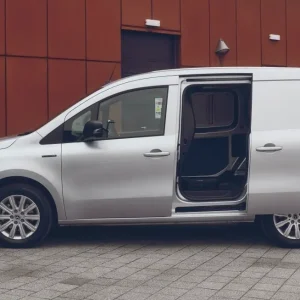 Nicholson McLaren converts petrol vans to run on liquefied petroleum gas (lpg). How many of these dual-fuel vehicles do you produce annually?
Nicholson McLaren converts petrol vans to run on liquefied petroleum gas (lpg). How many of these dual-fuel vehicles do you produce annually?
About 500. Around 90 per cent of them are Citroëns with Ford Transits making up the balance. Remember that not all that many petrol-engined vans are marketed in the UK, so the choice of vehicles available for conversion is quite limited. Of the new Citroëns we convert under the manufacturer’s Ready to Run programme, the most popular are the Berlingo and Dispatch. The latter is a relatively new addition and has been well-received. We offer a dual-fuel Nemo too, but not a Relay because it isn’t sold with a petrol engine. Ready to Run vehicles are delivered straight to us by the manufacturer, we do the conversion — we can ply-line the load area and apply graphics to the van’s exterior too on request — and we then arrange for the van to be delivered either to the supplying dealer or direct to the customer if it’s already received its pre-delivery inspection. We warrant the lpg system for three years/100,000 miles to match Citroën’s own warranty.
 What are the advantages of running on lpg?
What are the advantages of running on lpg?
Everything we produce is exempt from the London congestion charge. All you need to do is pay Transport for London £10 to register the vehicle. So far as exhaust emissions are concerned NOx (nitrogen oxide) and hydrocarbon output are lower than they are from a diesel while CO2 emissions are lower than they are from a petrol engine. Then there are the fuel cost savings. On average they are 40 per cent lower than petrol and 25 to 28 per cent lower than diesel. So far as duty on lpg is concerned (fuel duty rates are of course outrageously high in Britain – SB), government strategy as we understand it is to ensure that the lpg pump price is kept at 50 per cent of the petrol price and tax is levied accordingly. We should of course bear in mind that there may be a change of government this year.
Typically how long does the conversion work take?
About 12 hours. Because the van will still run on petrol as well as lpg the original petrol tank remains in place, but we of course also install an lpg tank. It’s doughnut-shaped and occupies the space usually allocated to the spare wheel. The spare can be relocated to the load area. We run copper piping from the lpg tank to the engine bay and fit a dedicated set of lpg fuel injectors to the inlet manifold.
What else do you have to do?
We install a vehicle-specific lpg ECU (Engine Control Unit) in the wiring loom that interfaces with the original petrol ECU. The system is designed in such a way that when the engine is running on lpg the petrol ECU thinks it’s still running on petrol, which avoids any engine management problems. The engine in fact starts on petrol, but switches to gas automatically almost straightaway if it’s warm. If it’s cold it switches to gas after around half a mile of driving and if it runs out of lpg it automatically switches back to petrol. On Berlingo the lpg filler point is positioned inside the petrol flap while on Dispatch it’s fitted in the rear quarter panel. On Nemo it’s fitted in the rear quarter bumper. A small lpg on-off switch is mounted on the dashboard and includes an lpg fuel-level indicator.
 Who supplies the systems you fit?
Who supplies the systems you fit?
We source them from a Dutch company called Eurogas, which is part of the Landi Renzo group. We work closely with Eurogas in designing the systems we want.
How much does the conversion work cost?
Approximately £1,825 plus VAT; the price varies a little depending on the model. If you deliver regularly into central London or you’re a high-mileage diesel user then the figures generally stack up. However, if you’re a low-mileage diesel user then you’ll need to do your sums very carefully.
Is it just big fleet operators who choose lpg?
No. Most people who opt for lpg run between five and ten vehicles. I’m thinking of couriers in London, contract cleaners, motor parts wholesalers… It’s a real mixture.
How far can a dual fuel van usually travel on lpg?
We aim to achieve a range of around 220 to 250 miles.
How much weight does the conversion add to the vehicle?
Roughly 25kg when the tank is empty; the Dispatch conversion weighs a little bit more.
Are drivers likely to notice any difference in performance when a van is running on lpg?
No, it’s near enough exactly the same.
What are the servicing requirements?
So far as Citroëns are concerned, Berlingo and Dispatch have to be serviced every 20,000 miles. With the 1.4-litre used in Nemo, however, the interval is 12,500 miles.
Are Citroën dealers able to handle the work?
In London many of them certainly are because we’ve trained them ourselves. We’ve also got a couple of independent lpg specialists there. On top of that we’ve got our own mobile service engineers.
How many service stations have lpg pumps?
Approximately 1,400, mainly Shell and BP sites. Some major fleets have lpg facilities in their yard. Lpg is of course far more widely available in the UK than compressed natural gas, its rival.
Do you think demand for your conversions will increase?
I think it will if diesel and petrol prices continue to rise.
There’s a move towards fitting passenger cars with turbocharged direct-injection petrol engines. Eventually they may appear in vans too. Are they likely to be difficult to convert to run on lpg?
It does pose some technical challenges but we’re working on a system that will overcome them.
In the past some customers who bought lpg vans sourced from certain other suppliers suffered reliability problems with them. Is reliability still an issue?
Unfortunately it remains a major one. A lot of people have had bad experiences with lpg vehicles and won’t touch them again. By contrast our products have developed a reputation for being reliable so we get a lot of repeat business. If you buy a conversion that works properly and you’ve seen the benefits you get from it then you’re going to want to buy another one. Remember by the way that some of the conversions out there aren’t London congestion charge exempt (check the PowerShift register to find out which ones are – SB).
Are the contract hire companies wary of lpg conversions?
One or two are, but we’ve supplied vehicles to quite a few of them. Our connection with Citroën’s Ready to Run programme clearly helps and we have of course been carrying out conversions for a long time.
 Is it right that you’ve also built an electric van?
Is it right that you’ve also built an electric van?
Yes. We’ve taken the 1.4-litre petrol Nemo, removed the engine and replaced it with an electric motor. We’ve worked with a small electronics company in Guernsey to design a battery management system and we’ve installed regenerative braking to help keep the batteries topped up. We’re using lithium-ion batteries and we can mount all of them underneath the vehicle. We’re looking to achieve a 70 mile range — it takes six to eight hours to recharge the batteries and you can do so via a standard 13 amp three-pin plug — and a top speed of 60mph. We’ve built five of these vehicles and tested them and one is about to go on trial with the Royal Mail. In fact we’ve got a queue of companies waiting for demonstrations. Citroën is aware of what we’re doing and is supporting us where it can.
When is the vehicle going on sale?
Early 2010 and our target price is £20,000; hopefully it will turn out to be slightly less. Remember that electric vans are zero-rated so far as Vehicle Excise Duty is concerned, they produce no exhaust emissions and cost very little to run. They’re also exempt from the London congestion charge.
Would you consider developing a hybrd diesel-electric van?
We’d probably look at it if somebody came along with a suitable budget but I don’t think we’d do it on our own initiative. If we did then we’d be competing directly with the vehicle manufacturers who are throwing millions and millions of pounds at the idea.
Do you have any connection with the McLaren motor racing team?
We have a historic one; John Nicholson was Bruce McLaren’s engine builder and we build engines for historic racing cars dating as recently as the 1970s. Although we’re based near Wokingham in Berkshire we’ve got a factory in north Wales where we carry out our electric and lpg conversion work — we’re always happy to advise existing owners of petrol vans as to whether their vehicle is suitable for lpg conversion or not — and where we also build very large motorhomes. In addition we refurbish light aircraft engines. If you’re landing on a grass strip, accidentally drop one of the wheels into a rabbit hole and the propeller hits the ground as a consequence, then we can put right any damage suffered by the engine.





